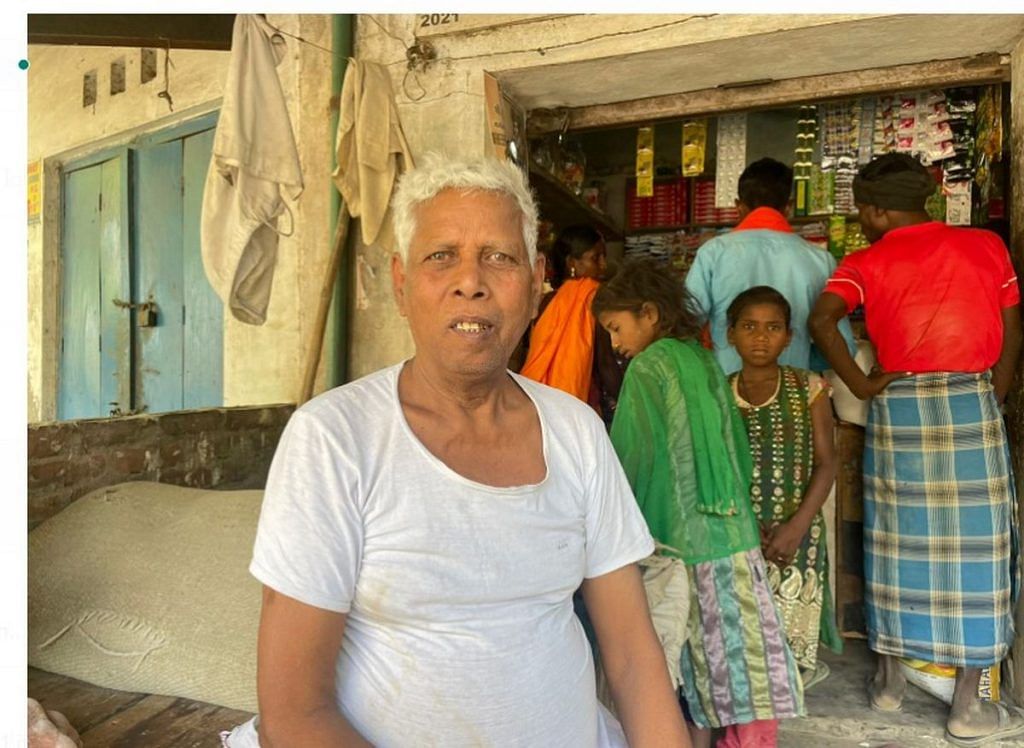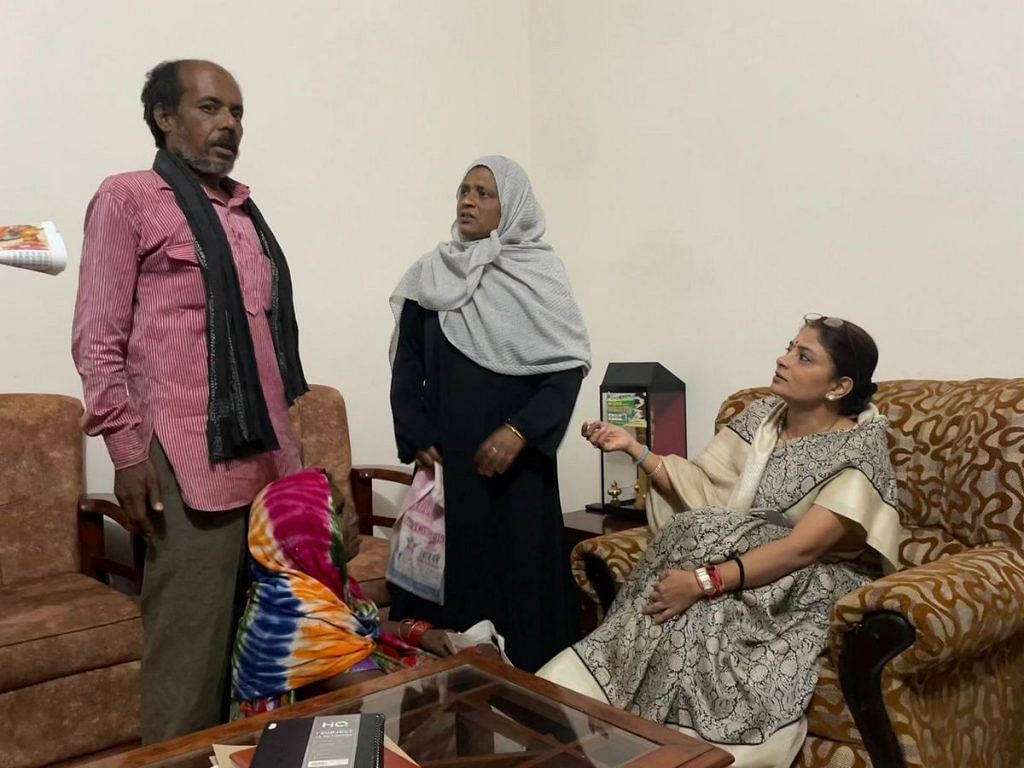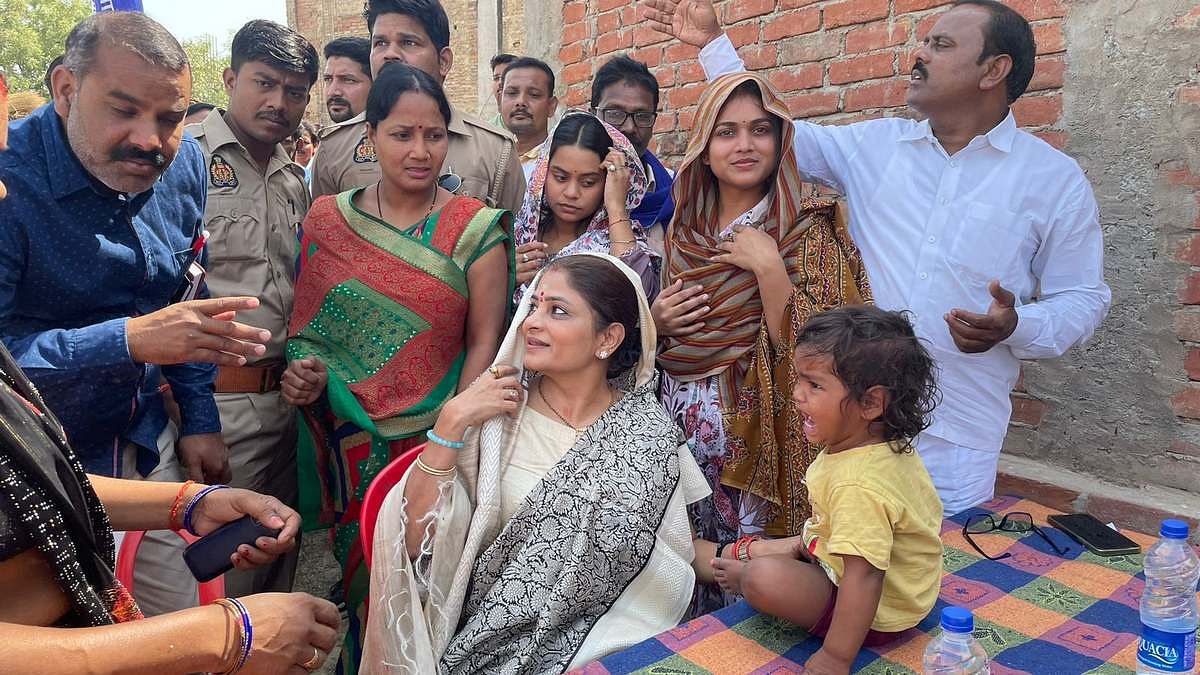Dhananjay, widely seen as a threat to the Bharatiya Janata Party (BJP) due to his influence among the constituency’s sizeable Thakur community, was arrested last month after a district court found him guilty in a 2020 case involving kidnapping, extortion, and criminal conspiracy — days after he declared that he would be contesting the Lok Sabha elections.
However, now a proxy battle has ensued, with the BSP announcing Shrikala — the sitting zila parishad chairperson of Jaunpur — as its surprise candidate for the constituency, which will vote in the sixth phase on 25 May.
Her entry into the election was announced with fanfare. Two days after the BSP formally declared her as its candidate, Shrikala rode around the constituency with a cavalcade of over a hundred SUVs — shiny black Fortuners, Scorpios, and Thars — with BSP flags fluttering through the sunroofs.
Overnight, the election in Jaunpur — hitherto a straight contest between the BJP and the Samajwadi Party (SP)— became a three-cornered one. The message was loud and clear: Singh might be in jail, but he still rules the roost in this part of the country.
Also Read: Businesses battered, but ‘aayega toh Modi hi’ — why Kanpur’s small business owners still back BJP
‘Har ghar se Dhananjay ladenge’
In the sweltering heat of a Thursday morning, a small crowd gathers in front of an Ambedkar statue in a Dalit-dominated village as Shrikala begins her campaign. “Sab log theek ba? Aashirwad debo (Is everyone doing well? Will you all bless me)?” she asks them.
Shrikala makes no bones about the fact that her fight is Dhananjay’s fight.
“My Hindi might be broken, but my feelings are the same as your bhaiyya’s (Dhananjay Singh),” she tells the crowd in a soft, non-politician-like voice. “He would have fought this election, but those evil people who are scared of him have put him behind bars. Ab har ghar se Dhananjay ladenge…Samajh awat hai (Now, Dhananjay will fight from every house…Do you all understand)?” she asks, amid nods from the crowd.

“His work counts here. He is always available to these people — he never asks anyone their caste or religion, only helps them,” she tells ThePrint. “It was a sure-shot winning seat for him, and they (the BJP) were petrified, so they put him behind bars.”
Less than 70 km away from Prime Minister Narendra Modi’s constituency Varanasi, in Jaunpur, Dhananjay Singh is a mythic figure.
For the poor here, words like gangster, mafia, bahubali have little meaning. Instead, in their minds, Dhananjay symbolises the lofty ideals of justice, benevolence, and the grand ambition of a man who can stand up to the state for his people.
“Dhananjay Singh is a mafia only for those who earn money through dubious means…He has never harmed a poor person in his life,” says Lal Chand Kumar, an 83-year-old grocery shop owner in Jaunpur. “If there is a marriage, he will send ghee, oil, ration, everything. He will never let a poor person go without help.”

The former Jaunpur MP may not be in the fray, but Kumar says his vote will “definitely” go to Dhananjay.
Even BJP leaders acknowledge Dhananjay’s “goodwill” among the public.
“He is a grassroots leader,” says a BJP worker, asking to remain anonymous. “He stays with the people of Jaunpur all the time. Koi samman ka bhooka ho ya paise ka, unke darwaze se nirash nahi laut ta (Whether someone is hungry for respect or money, no one leaves Singh’s door empty-handed). So, of course, people will vote for him.”
While it is Shrikala fighting the election, most people on the ground — both political opponents and supporters — refer to Dhananjay as the “candidate”.
That’s because he’s still running the show from jail, explains a local journalist on condition of anonymity.
“He is controlling everything — who to meet, who to pay, what to say, everything,” says the journalist. “He is a dal (party) in his own right. Just like any other party, he has election managers, booth-level workers, an election core committee…There is a sophisticated machinery at play, and he has thousands of workers of his own.”
Last Saturday, the Uttar Pradesh government shifted Dhananjay from the jail in Jaunpur to the one in Bareilly. This came after an MLA reportedly complained to the government that Dhananjay was pressuring people from jail to support Shrikala in the election.
However, shortly thereafter, the Allahabad High Court granted bail to Dhananjay, which means he is likely to be physically present in the campaign soon.
Crime, business, politics
Dhananjay Singh’s public goodwill, like that of many bahubalis, is intertwined with a history of crime that traces back to his days as a student at Lucknow University in the early 1990s.
Over the past three decades, he has faced 46 cases, ranging from attempted murder and criminal intimidation to extortion and rioting.
“He became a criminal during his college days,” says Kapil Dev Maurya, a senior journalist from Jaunpur. “The first case of murder came in 1992. From the start, it was a mix of crime and political activism because this was when he became very active in the anti-Mandal protests as well.”
It was during these years that Dhananjay befriended other emerging gangsters, like Ayodhya’s Abhay Singh. “They functioned as a gang at the university in those days,” Maurya says.

But it was in 1998 that Dhananjay first emerged as an anti-establishment hero in Jaunpur, defying both police and death.
This reputation came about after he was accused in 2007 of being involved in the murder of Public Works Department assistant engineer Gopal Sharan Srivastava, who was associated with then-chief minister Mayawati’s Dr Ambedkar Memorial Park project.
When Singh went on the run, the police placed a Rs 50,000 reward on his head. The same year, he was declared dead in a police encounter in Bhadohi, along with four others. Except, four months later, he showed up — alive.
“That was the first evidence of his dabangai (strongman image),” says Maurya. “He rose to instant popularity in the constituency.”
In 2002, using the campaign narrative of pran raksha, and garnering sympathy over a purported threat to his life, he won his first Vidhan Sabha election as an Independent candidate from Rari constituency — a seat he retained in 2007 on a JD(U) ticket.
In 2009, he jumped to the Lok Sabha, winning the Jaunpur constituency on a BSP ticket, while his father Raj Dev Singh took over the Vidhan Sabha seat in the bypoll.
At the same time, Dhananjay’s myriad businesses, primarily involving contracts in railways, PWD, mining, and so on, flourished.
His personal life was no less eventful. In 2007, his first wife was found hanging in her residence in Lucknow’s Gomti Nagar. The death was declared a suicide by the police.
In 2009, he married Jagriti Singh, a dentist, who was arrested in 2013 in connection with the death of her house help at their Delhi home — a case in which Singh, too, was charged with destroying evidence. He later divorced Jagriti, and in 2017, got married for the third time, this time to Shrikala in an extravagant wedding in Paris.
“It was an arranged marriage… my family in Telangana is also a political family, so we had friends in common,” Shrikala claims.
Shrikala’s father, Jitender Reddy, owns Nippo Battery, one of India’s top dry cell battery manufacturers, and has served as an Independent MLA in Telangana. Her mother, Lalita Reddy, has been a sarpanch.
Also Read: Communism, anti-Bhumihar mobilisation, philanthropy — the cult of the Ansaris in Ghazipur
Electoral math & the Thakur factor
Despite his popularity on the ground, Dhananjay Singh hasn’t seen electoral success in over a decade. Most parties have been reluctant to nominate him due to his controversial image. Consequently, since 2009, he has contested every election as an Independent or on a JD(U) ticket, and never managed to win.
“All he needs is a base vote,” argues Ashok Singh, the chief planner of the Shrikala-Dhananjay campaign. “In the 2022 assembly elections too, he had fought from the Malhani Vidhan Sabha constituency, and emerged second. The BJP lost its deposit at the time because of him. So, you can imagine why they are so scared of him and can go to any extent to jeopardise this election for him.”
However, political observers in Jaunpur narrate another story. They claim that since at least 2019, Dhananjay had been vying for a BJP ticket. When denied one in both the 2019 Lok Sabha elections and the 2022 UP assembly elections, he turned against the party, according to them.

Now, with the BSP’s Dalit vote base on their side, the Singhs are hopeful of winning the constituency, which has approximately 19 lakh voters.
“There are about 2.5 lakh Dalit votes in the constituency. That is what we are starting with. And they are the ones who come out to vote despite the heat because they are so politically conscious,” says Shrikala. “Moreover, 90 percent of the Thakurs are with us. Plus, there’s a whole host of others across castes who he (Dhananjay Singh) has helped — we have a formidable support base with us. Add to that the anger people are feeling over his arrest!”
Since his arrest, social media in Jaunpur has been flooded with posts proclaiming “Bhaiyya’s” purported innocence and goodwill.
While no official statistics are available, it is estimated that Thakurs comprise a voting population of about 2 to 2.15 lakh in Jaunpur. But over and above their numerical strength, the Thakur community has always wielded electoral and political power in the constituency. Many of the MPs in this seat, right from the beginning, have been Thakurs.
“Since the time of the British, Thakurs in this region have been educated and politically conscious,” says Surendranath Singh, an ex-BJP MLA from the constituency. “Now, even other communities are getting aware, but for a long time, it has been Thakurs.”
As someone who enjoys considerable control over the community, Dhananjay could snatch a significant chunk of the Thakur vote from the BJP in this election, even if Shrikala does not win the seat.
“They will end up dividing the Thakur vote,” says Surendranath Singh. “As of today, it seems that the young Thakur boys maygo with Dhananjay, while the older people will stay with the BJP.”
The former MLA adds that the BJP is trying to make people aware that one individual cannot hold the position of both MP and zila parishad chair according to new rules. “Moreover, we are telling them that they will not achieve much by electing a BSP MP…Behen ji will not get more than a seat or two in the entire state.”
Two ‘outsiders’ and a bahu
Even though she comes from Telangana, Shrikala is banking on another powerful campaign narrative — insider versus outsider.
Both the other Jaunpur candidates, BJP’s Kripashankar Singh and SP’s Babu Singh Kushwaha, are seen as “outsiders” to the constituency.
While 72-year-old Kripashankar Singh is a native of Jaunpur, he has spent his entire political career since the 1980s in Maharashtra — and that too, in the Congress. He even served as the state’s junior home minister in the Congress government.
Embroiled in cases of allegedly illegally amassing assets worth Rs 230 crore, Kripashankar joined the BJP in 2021 and was appointed as the BJP state unit’s vice-president.
His entry to Jaunpur shocked the local party unit, which had a host of contenders for the ticket.
“Pata nahi Kripa par kiski kripa huyi (Don’t know whose grace was bestowed upon Kripa),” says a local BJP leader. “The party cadres are very demoralised. When the BJP is in a dominant position, it should allow local leaders to rise — it increases its strength on the ground. But they have done just the opposite.”
The Rashtriya Swayamsevak Sangh (RSS) cadres are ostensibly not very pleased either. Their recommendation, it is said, was Gyan Prakash Singh, a prominent Jaunpur industrialist and philanthropist. Many people in the constituency claim he donated over a crore for the newly built RSS office in the city, and another crore for the Ram Temple in Ayodhya.
“Had Gyan Prakash been there, he could have won. He is a philanthropist like Dhananjay,” says Himanshu Agrehni, the owner of a small grocery shop. “God knows why (the BJP) have sent this gagan-vihari neta (a helicopter leader) here.”
Kushwaha has a similar story.
An ex-confidant of Mayawati’s — called her shadow for decades — Kushwaha was expelled from the BSP in 2011 amid allegations of his involvement in a Rs 1000-crore National Rural Health Mission (NHRM)-related scam in UP. He was arrested in the case by the CBI and jailed from 2012-2016.
Much like Kripashankar, Kushwaha, too, is seen as an “outsider” by SP’s party workers. However, political observers suggest that Kushwaha’s candidacy could help the party consolidate the votes of the Maurya community in the constituency.
“This election is the toughest for the BJP,” the BJP worker quoted above said. “The party will lose the Maurya vote, which it had in the last election, and a chunk of the Thakur vote could go to Dhananjay. We will be able to do something only if we are not delusional.”
To be sure, Shrikala, who hails from faraway Telangana, could be considered an outsider, too. But ask this question, and snap comes the answer from the public — “Bahu kab se bahari hone lagi (Since when have daughters-in-law started being considered outsiders)?”
Also Read: Nostalgia, betrayal & great expectations — why Gandhis still matter in Amethi & Raebareli
(Edited by Asavari Singh)

